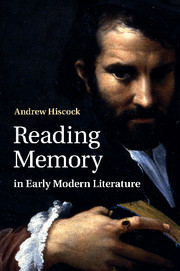Book contents
- Frontmatter
- Contents
- Figures
- Acknowledgements
- Introduction: ‘the dark backward and abysm of time’
- Chapter 1 ‘To seke the place where I my self hadd lost’: acts of memory in the poetry of Henry Howard, Earl of Surrey
- Chapter 2 ‘Remembre not (lorde) myne offences’: Katherine Parr and the politics of recollection
- Chapter 3 ‘Better a few things well pondered, than to trouble the memory with too much’: troubling memory and martyr in Foxe’s Acts and Monuments
- Chapter 4 Text, recollection and Elizabethan Fiction: Nashe, Deloney, Gascoigne
- Chapter 5 The Doleful Clorinda? Mary Sidney, Countess of Pembroke, and the vocation of memory
- Chapter 6 ‘Tell me where all past yeares are’: John Donne and the obligations of memory
- Chapter 7 ‘Of all the powers of the mind … the most delicate and fraile’: the poetry of Ben Jonson and the renewal of memory
- Chapter 8 ‘This art of memory’: Francis Bacon, memory and the discourses of power
- Notes
- Select Bibliography
- Index
Chapter 6 - ‘Tell me where all past yeares are’: John Donne and the obligations of memory
Published online by Cambridge University Press: 05 April 2014
- Frontmatter
- Contents
- Figures
- Acknowledgements
- Introduction: ‘the dark backward and abysm of time’
- Chapter 1 ‘To seke the place where I my self hadd lost’: acts of memory in the poetry of Henry Howard, Earl of Surrey
- Chapter 2 ‘Remembre not (lorde) myne offences’: Katherine Parr and the politics of recollection
- Chapter 3 ‘Better a few things well pondered, than to trouble the memory with too much’: troubling memory and martyr in Foxe’s Acts and Monuments
- Chapter 4 Text, recollection and Elizabethan Fiction: Nashe, Deloney, Gascoigne
- Chapter 5 The Doleful Clorinda? Mary Sidney, Countess of Pembroke, and the vocation of memory
- Chapter 6 ‘Tell me where all past yeares are’: John Donne and the obligations of memory
- Chapter 7 ‘Of all the powers of the mind … the most delicate and fraile’: the poetry of Ben Jonson and the renewal of memory
- Chapter 8 ‘This art of memory’: Francis Bacon, memory and the discourses of power
- Notes
- Select Bibliography
- Index
Summary
SIR, – Every Tuesday I make account that I turn a great hour-glass, and consider that a week’s life is run out since I writ. But if I ask myself what I have done in the last watch, or would do in the next, I can say nothing; if I say that I have passed it without hurting any, so may the spider in my window … to this hour I am nothing, or so little, that I am scarce subject and argument good enough for one of mine own letters.
Addressed ‘To Sir Henry Goodyer’This letter, signed rather unexpectedly ‘Your hearty true friend, J. DONNE’, amply demonstrates the abiding anxieties in evidence throughout Donne’s writing career concerning the pressures of memory and the limits of human achievement. Here, in 1608, during one of the most frustrating periods of his life when he was denied public preferment in the aftermath of his illicit union with Ann More, Donne was continually haunted by the prospect of his unrealised potential and prolonged social ostracisation. Indeed, his aspirations for political promotion appear in large measure to have been stifled in the opening decade of the seventeenth century by those who continued to remember the circumstances surrounding his marriage to his employer’s ward. In later years, as a preacher, he would console his congregations with the lifting of a favourite proof from Hebrews 12:6, ‘whome the Lord loveth hee chasteneth’, and this would emerge as a recurring theme in his sermons, as in 1625 where he confided to the assembled company, ‘All our life is a continuall burden, yet we must not groane; A continuall squeasing, yet we must not pant’ (Sermons, vii.1.54). Nonetheless, Donne himself was not always equal to the demands of such counsel in the early years of James VI/I’s reign as he lingered year after year on the margins of a society in which he sought advancement.
Despite the profound melancholia clearly being exhibited in his letter, Donne is ironically giving proof of a vexed enquiry that would be taken up by succeeding generations of his own readers: how would his life’s work be remembered by future ages? In fact, even during his lifetime this appears not to have been an unknown preoccupation. Ben Jonson, a notably competitive contemporary, observed archly in 1619 to Drummond of Hawthornden (if the latter’s memory can be relied upon) that ‘he esteemeth John Done the first poet in the World in some things’. Leaving his listener teasingly to hesitate between questions of hierarchy and chronology, Jonson nevertheless reverenced Donne with his own powers of memory. He informed Drummond that ‘[Donne’s] verses of the Lost Chaine, he heth by Heart and that passage of the calme, that dust and feathers doe not stirr, all was so quiet’. Ultimately, however, Jonson would respond uncannily to his fellow poet’s acute fears concerning loss, absence and indeed erasure with the verdict that ‘Done himself for not being understood would perish’. In the event, Jonson did participate in the memorialisation of his fellow poet: he is known to have assisted in the circulation of some of Donne’s poems, and he celebrated ‘the delight of Phoebvs, and each Muse’ in a dedicatory lyric that was printed at the beginning of each edition of Donne’s works from 1650 to 1669. Indeed, in another panegyric, he went as far as to name Donne as the sole arbiter of poetic excellence: ‘if I find but one [poem] | Mark’d by thy hand, and with the better stone, | My title’s seal’d’.
- Type
- Chapter
- Information
- Reading Memory in Early Modern Literature , pp. 165 - 191Publisher: Cambridge University PressPrint publication year: 2011
- 1
- Cited by



